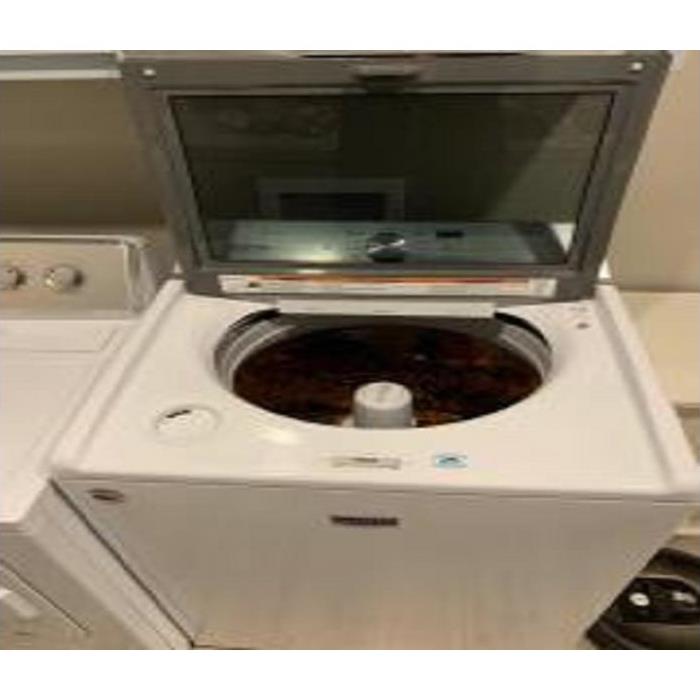Recent Water Damage Posts
Preparing Your Home to Stay Dry During the Fall Season | SERVPRO of Conway & Faulkner Counties
9/3/2024 (Permalink)
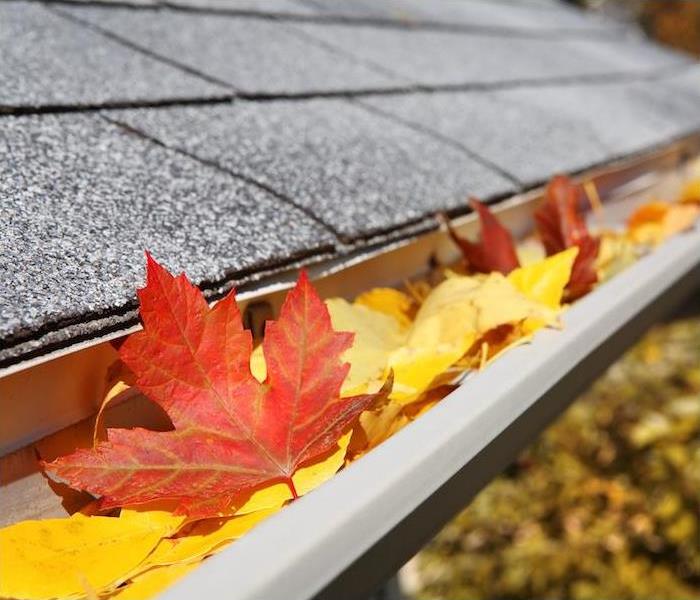 Safeguarding your home from water damage is easy this Fall with these insights from SERVPRO of Conway & Faulkner Counties!
Safeguarding your home from water damage is easy this Fall with these insights from SERVPRO of Conway & Faulkner Counties!
As fall arrives and the weather shifts, it’s the perfect time to think about how to protect your home from water damage. The combination of cooler temperatures and increased rainfall can create vulnerabilities in your home if you’re not prepared.
Here’s a guide to help you get your home ready for the fall season and prevent potential water damage issues.
Inspect and Clean Gutters and DownspoutsOne of the key aspects of preparing your home for fall is ensuring your gutters and downspouts are clear and functioning properly. Over the warmer months, leaves, twigs, and other debris can accumulate in your gutters, creating blockages that prevent rainwater from draining away effectively. During the fall, falling leaves can exacerbate this problem, leading to potential overflow and water damage to your roof, siding, and foundation.
To avoid these issues, regularly inspect and clean your gutters and downspouts. Remove any debris and check for any signs of damage or leaks. Ensuring a clear path for water will help protect your home from unwanted water intrusion.
Seal Windows and Doors Against DraftsWith the arrival of fall, the cooler temperatures and increased precipitation can lead to drafts and water leakage if your windows and doors are not properly sealed. Inspect the caulking around these areas to ensure there are no gaps or cracks where water could enter. Reapply caulking as needed to maintain a tight seal.
Additionally, check the weather stripping around doors for any signs of wear and replace it if necessary. Properly sealed windows and doors not only keep moisture out but also enhance your home’s energy efficiency, helping to keep it warm and reduce heating costs as temperatures drop.
Take Care of Your RoofYour roof is your home’s primary defense against the elements, so it’s crucial to inspect it as fall begins. Look for damaged or missing shingles, as these can create vulnerable spots where rainwater might seep through. Pay special attention to areas around flashings and chimneys, as these are common spots for leaks. Additionally, clear away any fallen leaves or branches from your roof to prevent moisture buildup that can lead to mold or algae growth.
If you’re unsure about inspecting or repairing your roof yourself, consider hiring a professional to ensure everything is in good condition for the upcoming season. Taking these proactive steps to prepare your home for fall can help prevent water damage and keep your property in excellent shape throughout the season. If you need assistance or encounter any issues with water damage, SERVPRO of Conway & Faulkner Counties is Here to Help®.
Our team of experts is ready to provide the support and solutions you need to protect your home. Contact us today to learn more about our services and how we can assist you in safeguarding your property this fall.
Preventing Water Damage During the Rainy Season | SERVPRO of Conway & Faulkner Counties
5/15/2024 (Permalink)
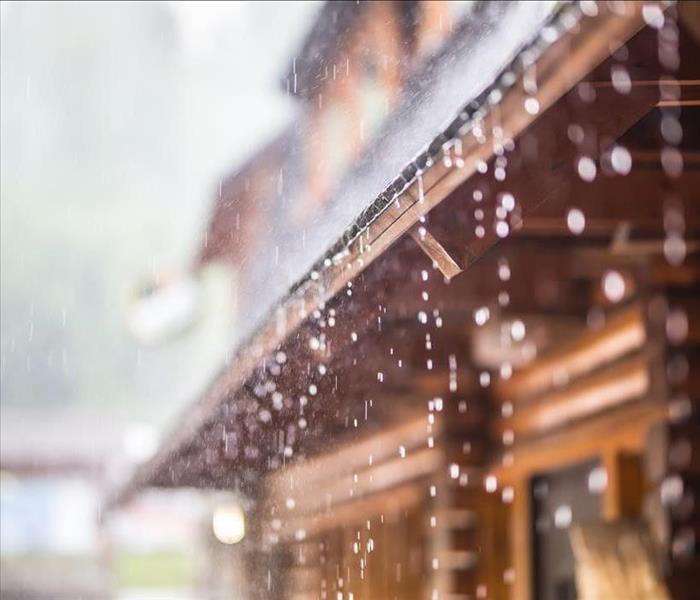 If you're facing water damage, rely on the assistance of SERVPRO of Conway & Faulkner Counties.
If you're facing water damage, rely on the assistance of SERVPRO of Conway & Faulkner Counties.
Spring is a beautiful season with new growth and warmer weather, but it also brings heavy rainfalls. As the temperature rises and storms roll through our community, water damage becomes much more common and your risk rises considerably.
Water damage can lead to costly repairs, mold growth and structural damage. Below are some tips from our SERVPRO® team to prevent water damage during the spring rainy season.
Maintain Your Gutters and Downspouts
Gutters and downspouts play a crucial role in preventing water damage to your home. They channel water away from your house and protect your foundation, and clogged gutters and downspouts can cause water to overflow and seep into your home.
Make sure to clean your gutters and downspouts regularly to prevent clogs. You can also install gutter guards to help keep debris out of your gutters. You should also make sure that your downspouts are secure and pointed away from your home’s foundation.
Inspect Your Roof and Siding
Your roof is your first line of defense against water damage, so you should inspect your roof regularly for any missing or damaged shingles, cracks or holes. If you notice any issues, make sure to address them immediately. Water can seep through even the smallest opening and cause damage to your home’s interior. If you are not comfortable inspecting your roof, hire a professional to do it for you.
Water can also enter your home through even the smallest opening. Check your foundation, windows and doors for any cracks or openings that could allow water to seep in. Seal any openings or cracks with caulk or weather stripping. This will not only prevent water damage but also improve your home’s energy efficiency.
Be Prepared
Despite your best efforts, water damage can still occur, so it’s essential to be prepared in case of a water emergency. Make sure you know where your main water shut-off valve is located in case you need to turn off your water supply quickly.
Keep important documents and valuables in a waterproof container and store it in a safe location. In the event of water damage, don’t hesitate to give us a call! Our trained technicians have the expertise and equipment to quickly and efficiently restore your home to its pre-damage condition.
Preventing water damage during the spring rainy season is crucial for protecting your home and avoiding costly repairs. Regularly maintaining your gutters and downspouts, inspecting your roof, sealing cracks and openings and being prepared to react quickly can all help prevent water damage.
If you do experience water damage, remember that we are here to help. Our team is available 24/7 to respond to water emergencies and will handle your water damage restoration from start to finish.
Dealing with water damage? SERVPRO of Conway & Faulkner Counties is here to help.
Preventing Stinky Odors After a Water Disaster | SERVPRO of Conway & Faulkner Counties
5/1/2024 (Permalink)
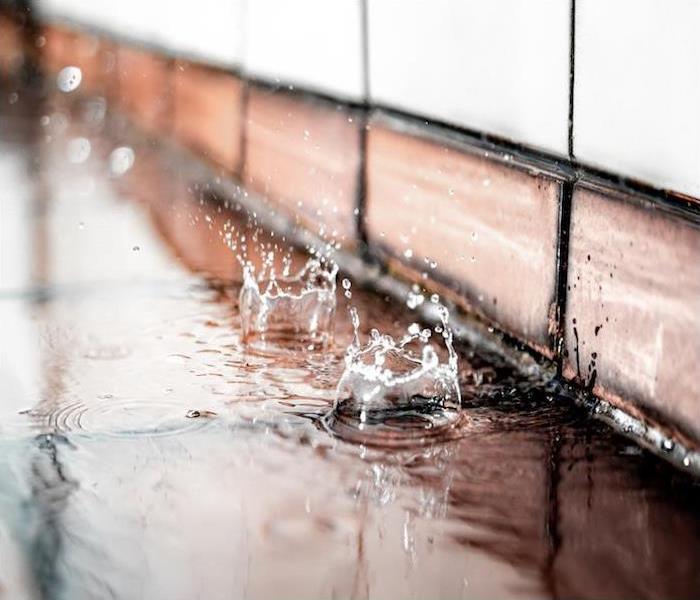 Trust our team at SERVPRO of Conway & Faulkner Counties to provide comprehensive services for a full recovery for all water damage restoration needs.
Trust our team at SERVPRO of Conway & Faulkner Counties to provide comprehensive services for a full recovery for all water damage restoration needs.
The long day is over at last, and it’s time to go home and relax. You unlock your door and step right into a water puddle. Oh, no, a water leak!
Suffering from any sort of water disaster is always really frustrating, but especially if you aren’t expecting it. While you busy yourself with grabbing some towels or a mop to clean up the standing water, the damage may have already been done.
Depending on how long the water was left to sit before it was discovered, you could be dealing with moisture in really hard-to-reach places and things like mold growth and mildew are now possibilities. Our team explains what to do when you suffer a water leak to avoid all those unpleasantries below.
What to Do About the LeakOnce water has gotten where it shouldn’t, it can start to cause problems rather quickly. It will leak and seep through your floorboards, soak into your carpet, and get behind your drywall with little effort.
In the event of a water leak at home, your first instinct may be to grab towels and start wiping up the visible water. However, this will not solve the problem entirely. The moisture that seeps into crevices and behind walls can linger and cause more damage.
Without proper ventilation, this kind of moisture can lead to structural degradation, rusting of metal support systems and even mold growth. It is important to call in professionals to address water leaks to prevent further damage to your home.
We want you to call us within 24 hours of your water disaster! This is because mold infestations can set in within 24–48 hours after the water event. Time is of the essence!
Using Your Nose WiselyOne of the most familiar attributes about mold is the smell. It often gives off an earthy or musty odor, which can be easily identifiable if you have just suffered a water leak.
However, tracking down the mold may be more complicated than you thought because it could be growing under your floors or is tucked away behind your drywall.
That’s where we come in! Our talented team of professionals will locate the source of the stink, and we will work quickly to secure the area. We will start by turning off vents and your HVAC system and then we will start filtering the air to remove all of the odor particles. We will finish by cleaning and sanitizing the area to make sure your home is fresh and clean once more.
When it comes to water damage and unpleasant odors from mold, our team will take care of you from start to finish.
Don’t ignore signs of a water leak. Contact SERVPRO® for a full recovery.
Alert! Staying Informed During Spring Storm Season | SERVPRO of Conway & Faulkner Counties
3/15/2024 (Permalink)
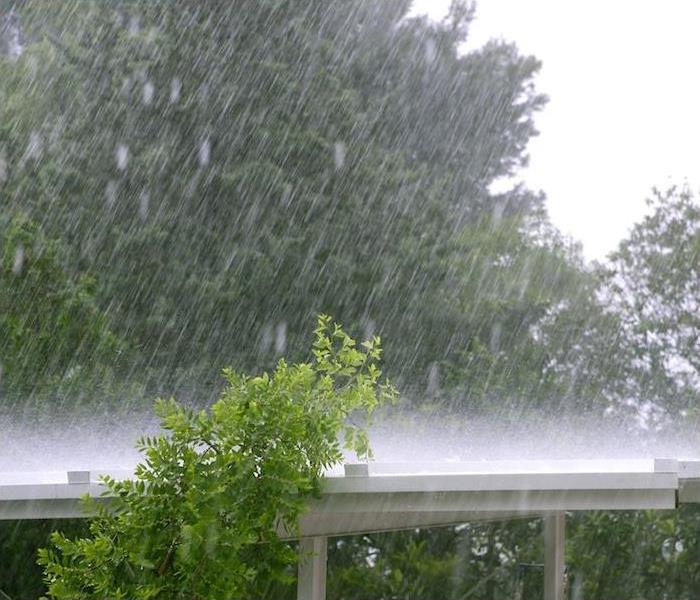 SERVPRO of Conway & Faulkner Counties is ready to help you get from April showers to May flowers.
SERVPRO of Conway & Faulkner Counties is ready to help you get from April showers to May flowers.
The temperature is rising, the days are getting longer and the flowers are about to bloom once more! There’s no doubt about it, spring is on the way. That also means that severe storms are going to start popping back up in the south, so we all need to stay vigilant so we can stay safe.
Are your alert systems ready to go? Our team explains some easy ways of staying informed during severe weather season, so read on to gather some great insight and ideas.
Harnessing the Power of the InternetWhere is your phone right now? In your hand or sitting next to your computer? We all have our devices so easily accessible, which is part of what makes them so useful in emergency situations.
Did you know that the Wireless Emergency Alert system is already programmed into your phone and can automatically issue weather alerts if needed? Just be sure to check your notifications and have them turned on. In addition, various weather apps can (and should) be downloaded so you can check the forecast daily and even more often when poor weather is on the horizon.
That being said, use caution when it comes to choosing which weather apps to trust. Not every app is created solely for informational purposes and some of them tend to inflate or over exaggerate the forecast for engagement purposes.
Be sure to download apps from national or locally trusted sources. If you live in Faulkner County, sign up for Code Red Weather Alerts. If you live in Conway County, check out the county’s website for helpful sheltering information.
The TV and local news stations can be really helpful as well! Local anchors track weather systems as they move across our counties, and you can watch the progression in real time. This is also an advantage because you will be notified immediately when it is time to take shelter.
Non-Electronic AlertsWhile having your phone nearby is a necessity, you should also have at least one backup alert system that will work even if we were to lose power unexpectedly. Your phone and your laptop will only work while your batteries are charged, and your TV will immediately be rendered useless. Because of that, having a system in place that will work regardless if the lights are on is crucial to your safety.
Weather sirens positioned around town can be a great way to stay informed. Take the time during the next siren test to walk around your home and determine if you can hear the siren from each space.
You should also consider researching and purchasing an NOAA weather radio. Weather radios are portable and compact, which means you can take them with you wherever you go. They also operate without the need for power via either hand-crank capabilities or by solar power, which makes them a really reliable way of staying informed no matter your situation.
Feeling prepared? Knowing what to expect is half the battle, but the other half is weathering through the storms as they pass over us. If your home suffers from any sort of damage, call us immediately so we can tackle your repairs and restoration.
Serious storms can cause serious property damage. Call SERVPRO® 24⁄7 for immediate restoration assistance.
Tackling Home Damage Restoration With Our Team | SERVPRO of Conway & Faulkner Counties
2/1/2024 (Permalink)
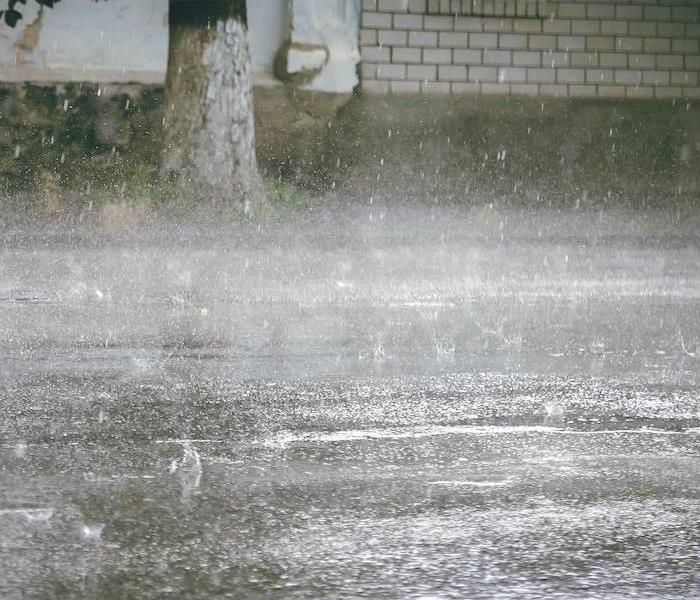 SERVPRO of Conway & Faulkner Counties is Here to Help® when any disaster strikes!
SERVPRO of Conway & Faulkner Counties is Here to Help® when any disaster strikes!
The phrase “when it rains, it pours” can be applied to many life situations. Setbacks at work, relationship changes and even home disasters can all occur and take us by surprise. Any particular situation can become more than we expected, leaving us with many questions and not enough answers.
This is especially true when it comes to home damage following a disaster situation. The woes of Mother Nature, as well as simple home accidents like broken dishwashers, can cause serious damage without much warning.
The team at SERVPRO of Conway & Faulkner Counties is here to ensure you make a full recovery no matter the extent of your damage. We are ready to help when you need it most.
Disasters, ExplainedThe different disaster scenarios that are possible are endless, and each instance can cause a strain on your household or even on our entire community. It can be overwhelming even if we are expecting a situation, like a strong storm.
Heavy rain can have us all running for the safety of our homes, but it can become too much too fast and lead to flooding and mold concerns. Minor kitchen fires may seem contained in the moment, but you could be surprised to find soot and lingering smoke odors in other levels of your home.
These types of compounding damage can be really frustrating to deal with, and the longer you wait to address the problem, the worse it can become.
That’s why a quick response is always necessary! Our team is here to answer your call for help and we will get right to work for you.
A Single Team, Endless PossibilitiesEvery minute matters when it comes to reliable disaster recovery, which is why we are here 24⁄7 to respond to your home or business emergency. We know that quick action needs to be taken to avoid serious structural damage from setting in, so we get right to work to help you recover quickly.
Our highly trained team members will focus our efforts on your recovery based on your home’s specific needs. We will adjust your recovery plan no matter what kind of fire, water or storm damage is present. Our team is also locally owned and operated right here in the Conway community, which allows us to truly be faster to your home disaster.
We can do everything from securing your roof after suffering storm damage to pulling smoke odors out of your air after suffering a house fire. We have the tools and training to get it done for you quickly and efficiently.
Another benefit of working with us is that we are a one-stop-shop for all of your restoration needs! You can say goodbye to working with multiple contractors and agreements and relax in the knowledge that we will handle everything from start to finish.
We are ready to go to work for you, all you have to do is call. We know that suffering a home disaster can be frustrating, but we can assure you that SERVPRO® is here to make sure sunnier days are right around the corner for you.
Have you experienced a disaster and need restorations? Make one call to our office to start recovery fast.
Suspect a Water Leak? Look Here First | SERVPRO of Conway & Faulkner Counties
1/2/2024 (Permalink)
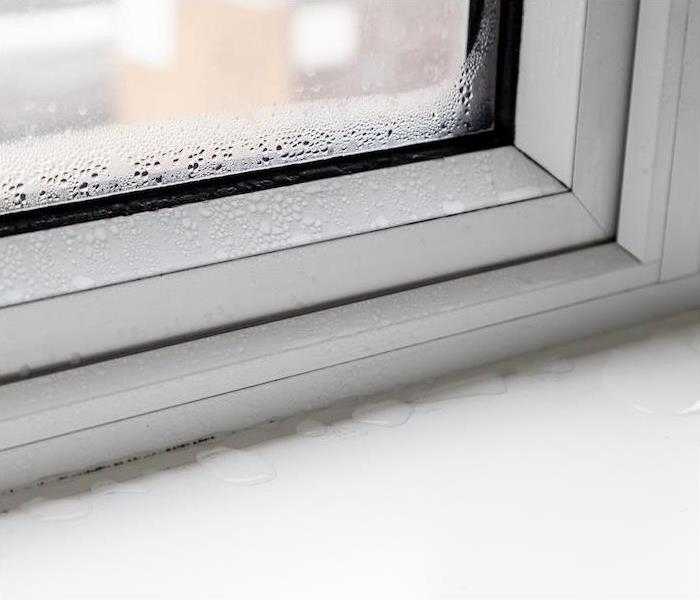 Water damage can happen anywhere in your home. Call SERVPRO of Conway & Faulkner Counties to restore water damage on your property 24/7, 365.
Water damage can happen anywhere in your home. Call SERVPRO of Conway & Faulkner Counties to restore water damage on your property 24/7, 365.
Water serves such an essential role in our lives, and we rely on it to get all kinds of things done in our households on a daily basis. It is the star of many cooking ventures, the best way to get dishes, pets and kids clean after a long day and it freezes nicely into the ice cubes that chill our drinks.
This easy access to water makes our lives more efficient, but it can also increase our risk of suffering from water damage from time to time. Water leaks can happen at any moment, so knowing where to go looking for them is essential to stopping a problem from getting worse.
Under the SinkWe all have at least one sink in our houses, and that sink holds an important role of draining water efficiently through your water lines. A single loose connection or a deteriorating seal can be the catalyst for a serious water leak to happen under your cupboards.
Once a water leak starts in an unsuspecting spot, it can quickly seep and drip into your wooden cupboards, down your walls and under your floors. If you come upon a new puddle on the ground or notice a dip in your water pressure, get down below to investigate further.
Under or Behind AppliancesMany of us rely heavily on our appliances to help us get through our days and they can make our lives so much easier! However, a single leak or electrical malfunction can cause water to pour out onto your floors without much notice. Dishwashers, water heaters and washing machines are often the largest culprits when it comes to water leaks.
To add to the frustration, many water leaks begin behind or beneath appliances, making it hard to spot at the beginning. Try to get into the habit of pulling your machines away from the wall regularly to check underneath and behind them. A single water spot or a small mold colony should prompt you to take action right away.
Behind DrywallIf a water leak does happen in your house, you hope that it occurs in an easily accessible area. That can make cleanup and any restoration a bit easier. Unfortunately, water leaks often happen behind walls or under floors because that’s where all of your water lines eventually lead to!
If you start to notice your home smells musty or a spot near your ceiling is slowly getting darker than the rest of the wall, it may indicate a water leak behind your wall.
Window and Door Water LeaksCondensation is a natural process that happens when the moisture in the air reacts to the drastic temperature change between the inside and outside. If condensation forms on your windows, it can seep down and settle onto your window sills or get behind your drywall.
Windows and doors can also experience structural aging and start to sag against their frames. If that happens, moisture can easily get in through those small gaps and cracks that appear and leak down your walls.
If you do become the victim of water damage, SERVPRO of Conway & Faulkner Counties is here to help. We will make sure all of the excess water is removed and your home is restored quickly. Call us today for a faster and more thorough restoration.
Don’t ignore signs of water damage! Call SERVPRO® for a quick restoration.
Don’t Stand for Standing Water at Work | SERVPRO of Conway & Faulkner Counties
12/1/2023 (Permalink)
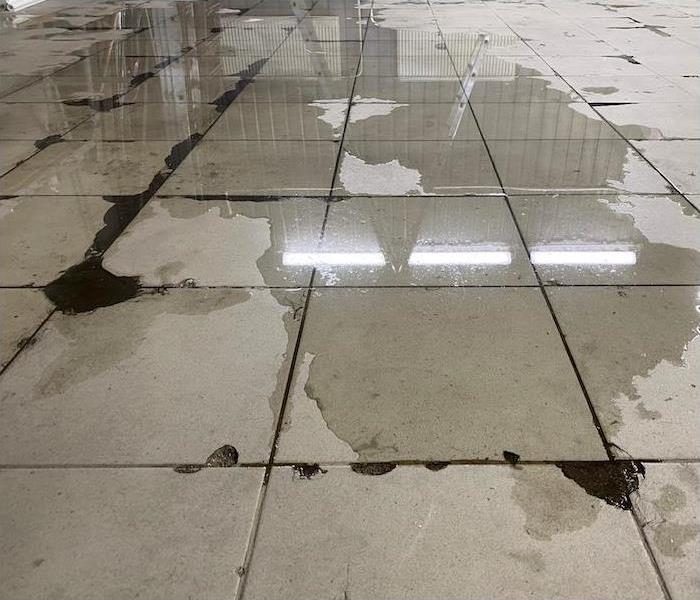 Give SERVPRO of Conway & Faulkner Counties a call to restore your business from water damage!
Give SERVPRO of Conway & Faulkner Counties a call to restore your business from water damage!
You are busy getting ready for another regular day at work—you arrive, start turning on lights and unlocking doors, only to be hit with a musty odor of stagnant water. Where is the water leak and when did it exactly start?
Water leaks can happen at any point at your business, and they are always inconvenient. While minor leaks can usually be contained and cleaned up quickly, serious floods or burst water lines can feel like true nightmares.
No matter how your business suffered the water disaster, tackling the cleanup quickly is crucial. The sooner you can address the situation, the less damage you will have to overcome. Follow the steps below to stay in control when you come upon a water disaster at work.
<h3steps-toward-success">The Steps Toward Success
Discovering a water disaster at work can be really unnerving, especially if it is a complete surprise. Try to stay calm and follow these easy steps to help you focus on what needs to be done and to stay in control of the situation.
1. Stay safe. Just like anything else in life, staying safe should be your top priority. Get yourself and your employees to a safe location, and then assess the situation. Take some pictures of the situation and call SERVPRO® right away so we can start creating your recovery plan.
2. Control the disaster. While we have a quick response time, there will still be a small amount of time from when you call us to when we arrive at your home. Because of this, taking control by stopping the flow of water can help minimize your damage. Identify the source of the water as quickly as possible, and shut off the water valve that is controlling the flow of water. If you can’t find it quickly and water is still pouring out onto your floor, shut off the main waterline just to be safe.
3. Start the drying process. You will want to open some windows and turn on some fans to remove start the drying process, but try not to walk through the water if you don’t have to. Floodwater can pick up all kinds of hazardous substances along the way, like sewage, chemicals and storm runoff. Keep the area secure and closed to the public while you wait for us to arrive.
<h3recovery-process">The Recovery Process
You might breathe a sigh of relief to see our trucks in your drive! Our team will get right to work assessing the situation and setting up our drying equipment to remove the standing water. We will also address the source of the leak and secure that situation as well.
We will work with your insurance company throughout the entire process, so all you have to do during this time is focus on the well-being of your team. We often can find a way to section off the affected area so you can continue to operate however you are able until the repairs are complete.
Our team is dedicated to helping you overcome your water disaster as quickly as possible because we know how detrimental long-term closures can be to the success of your business.
Lean on us when you suffer water damage, and we will work alongside you to tackle your standing water issue in no time at all.
Do you need repairs after a water disaster in your commercial building? Contact us to get dried out quickly.
The Steps Following a Water Disaster at Your House | SERVPRO of Conway & Faulkner Counties
9/19/2023 (Permalink)
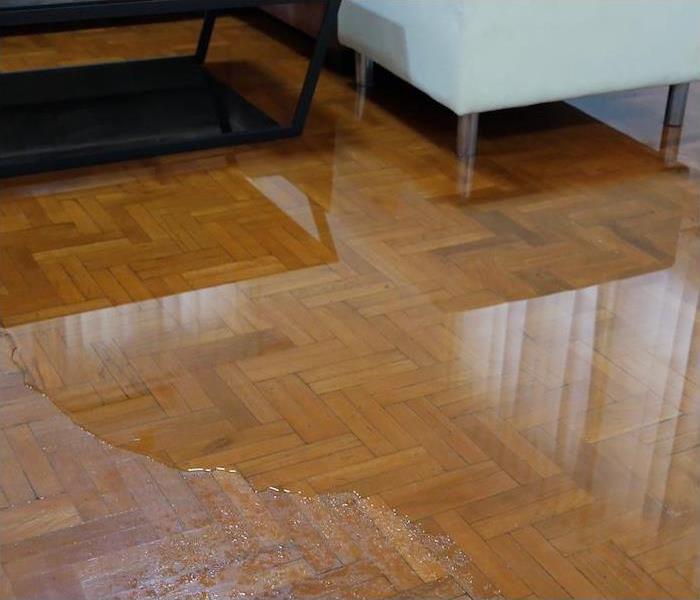 If you discover water damage in your home or business, call SERVPRO of Conway & Faulkner Counties right away.
If you discover water damage in your home or business, call SERVPRO of Conway & Faulkner Counties right away.
We all rely on the constant flow of water in our homes on a daily basis. We pump water through our pipes to wash our dishes, rinse our clothes, make dinner and even brew that perfect first cup of morning coffee. Water is an incredibly powerful resource that we have the privilege to have in our homes.
However, water also has the potential to be really problematic in our homes if it winds up where it shouldn’t be. In addition to burst pipes and appliance malfunctions, Mother Nature can also send rain from above to wreak havoc. In fact, we have had a really volatile storm season so far that has left many of our community members struggling with storm damage and resulting water damage.
While it is always better to take steps to avoid water damage altogether, sometimes it’s just not possible due to accidents or the forces of nature. Thankfully, SERVPRO® of Conway & Faulkner Counties is here to help!
What to Do FirstDiscovering a water leak can sometimes be a shock, especially if there is a lot of it or if it is flowing into your home quickly. You need to act just as quickly to control the situation before it gets worse. Water will seep and leak into every available crevice in minutes, and it can be impossible to dry up on your own if it gets under your floor or behind your walls.
If the water leak is due to a faulty pipe or appliance, shut off the water supply by closing the appropriate water valve. If your home was damaged in a storm and the rain is coming in, you may just have to wait it out with a bucket to catch the drips until the threat has passed.
Remember, wading through standing water in your home is never a good idea. Live electrical wires or sharp debris may be lurking under the surface. Go around or avoid the area entirely.
Now it’s time to call SERVPRO. Our team is here 24⁄7 to respond to your call for help, and we are ready to respond as soon as you reach out to us.
Our Thorough Drying and Cleaning ProcessOur first phone call with you will involve a lot of questions to help us better understand your situation. While we are chatting, start taking some photos of the damage. This will help us create a more robust plan for you, and it will also help make your insurance claims process easier.
Once our team arrives at your door, we can get to work cleaning and drying out your space. We will bring in air movers and blowers to get things dried out, and we will also focus on saving your possessions. Soft materials can often be dried out completely with the right training and tools, so we work quickly and efficiently to avoid irreversible damages. After everything is dry, we will clean, sanitize and deodorize the space.
We can also handle any repairs that are needed! Even just a few drops of water can cause warped walls or wood, so we will pinpoint each area of your home that requires repairs and jump right into action. We won’t stop working for you until you are 100% satisfied with the final product.
You can rely on SERVPRO of Conway & Faulkner Counties to take your home from wet and soggy to dry and repaired in the blink of an eye. Call us to get started today.
Do you have water damage in your home? Call us for fast and complete restoration.
Tips for Responding to Flooding Situations in Your Home | SERVPRO of Conway & Faulkner Counties
9/19/2023 (Permalink)
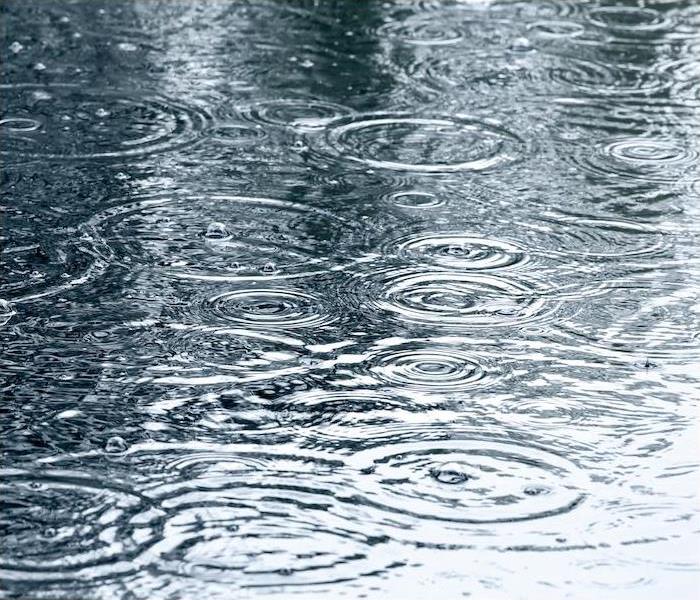 Water damage in your home? Not for long with SERVPRO of Conway & Faulkner Counties on the case!
Water damage in your home? Not for long with SERVPRO of Conway & Faulkner Counties on the case!
We can all appreciate a good rainstorm at this time of year. Sometimes our lawns really need it, and other times, it can be really refreshing after a long stretch of hot and humid days. But while a soft and gentle rainfall may be calming, more severe weather usually isn’t.
Severe storms can rip across our landscape to dump intense waves of rain on our houses along with high wind and occasional hail. While we can rely on our homes to keep us dry and safe the majority of the time, heavier rain can sometimes force its way into our homes in a variety of locations.
Our SERVPRO® of Conway & Faulkner Counties team wants you to stay safe under any circumstances, so we explain some easy ways to prepare for intense rain as soon as a watch or warning is issued.
Rain and the Conway AreaStorms are a regular part of summertime in the Conway area, and this year was no different. In addition to mild to moderate rainstorms, we also suffered some pretty extensive damage across our community. Rain has the unique ability to cause a wide variety of damage from ruined walls to flooded yards and basements.
While there is nothing we can do to stop Mother Nature, we can be prepared for the different scenarios when they do occur. Stay connected to the forecast and understand the different potential threats so you can take action right away.
Steps for Staying Safe During a Weather WarningSafety for your family and your home is always a top priority during severe weather. Postpone or cancel any outdoor plans and head home to start preparing, just be sure to avoid any roads that you know tend to flood easily in the process.
Once you are all safely home, start preparing your yard and property. Tidy up any loose items like toys or lawn equipment, and pull your car into the garage. Tie down anything that can’t be easily picked up, like your trampoline and lawn furniture, and then head inside.
Move any fragile or sentimental possessions away from the walls and off the floor of the lowest level in your home and turn off electricity to those rooms just to be on the safe side. After that, all you can do is stay inside and wait it out. If water does start leaking into your home, stay calm and simply call our water damage restoration team for a full restoration.
Protective Measures for Future StormsIt can be frustrating enough to deal with the current damages, let alone think about them potentially happening again. These type of situations can be overwhelming, but they can actually help you fix the problem for good! For example, if you always have water issues in your basement and your sliding door seems to leak water whenever it rains, you can turn your attention to any seal repairs or consider grading your yard to ensure any rain that does fall will flow in the opposite direction of your house.
If your basement always floods when it rains really hard, consider investing in a sump pump. Sump pumps automatically turn on when they sense excess water near your foundation, so they will collect the water and pump it back to the surface.
Water and flood damage are unfortunately always a possibility no matter how much you prepare. Just remember that our restoration team is available day and night to help you recover faster!
We are here for all of your water disasters. Contact us day or night for a quick recovery.
Discovering Water Damage Fast | SERVPRO® of Conway & Faulkner Counties
5/9/2023 (Permalink)
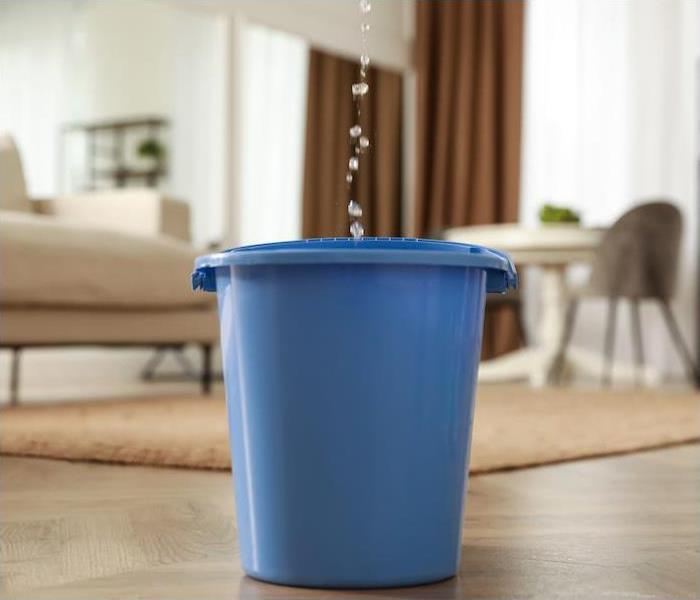 Think you may have water damage in your home? Here are some tips from SERVPRO of Conway & Faulkner Counties to find the source.
Think you may have water damage in your home? Here are some tips from SERVPRO of Conway & Faulkner Counties to find the source.
Water damage is a tricky form of home damage. Not only can it occur in large and catastrophic situations like floods, but it can also happen slowly with a single drip around a leaky pipe.
No matter how it happens in your Conway-area home, it can be overwhelming to deal with. The best way to prevent widespread damages is to understand where water damage typically occurs so you can help stop a problem right away.
Our team has laid out some of the most common locations for water damage below, so check it out to stay informed.
Your roof. When was the last time you were up on your roof? If you can’t easily remember, it’s time to get up there and look for signs of damage.
Gaps along your roofline, sagging sections and missing shingles all increase your risk of experiencing water damage, so it is important to address these issues right away.
If you don’t repair the damage as soon as you discover it, your home will certainly suffer during the next heavy rain. Water can easily infiltrate your roof and travel elsewhere in your house.
Water can drip and leak throughout your entire home if the leak is not caught in time. It can warp floors, soak walls and even start to affect your home’s structural integrity. In time, it can contribute to mold growth as well.
In your bathroom. Our bathrooms are one of the most used rooms in our entire homes, so it is no wonder that water damage often starts here. Each water line and drain has the potential to leak or get clogged, leaving you with a puddle and a quickly escalating situation.
Do your best to check around your bathroom often for signs of damage and try to reduce your moisture levels by running a fan or opening a window to completely dry out your bathroom between uses.
Household appliances. If you are a homeowner, chances are that you have at least one appliance that relies on water in order to function. Dishwashers, fridges and washing machines are all common culprits for causing water damage.
Since we don’t often pull these bulky appliances away from the wall, it can be hard to spot an emerging issue until it is too late. Water damage and mold growth could have been happening for a long time until it is discovered!
Run your hand along these appliances often to check for drips or lingering moisture, and certainly investigate any new puddles on the ground. If you are financially able to do so, consider replacing your appliances regularly to ensure you have the latest and most reliable technology in your home.
However, water damage isn’t the end of the world when you have SERVPRO of Conway & Faulkner Counties on your side. Just call us, and we will be there to repair your home in no time at all.
Dealing with a water emergency? Our SERVPRO specialists can be on the scene of the disaster ASAP to restore your water-damaged home!
Keeping Water Troubles at Bay | SERVPRO® of Conway & Faulkner Counties
12/29/2022 (Permalink)
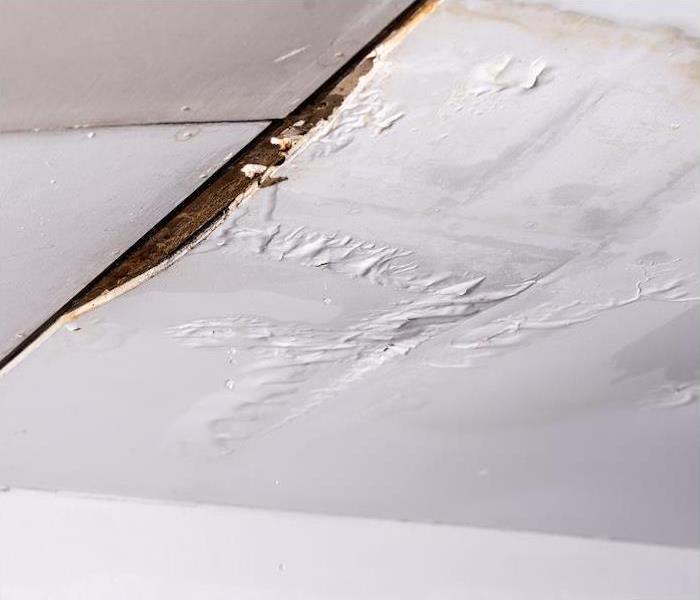 If you experience any water damage inside your home or business, reach out to SERVPRO of Conway & Faulkner Counties.
If you experience any water damage inside your home or business, reach out to SERVPRO of Conway & Faulkner Counties.
Slowly leaking water problems aren’t always easily noticeable. Sometimes a situation can develop slowly through a tiny leak and you won’t notice until the damage has already been done!
Excess moisture can cause a multitude of problems within your home. Stopping a water leak at its source is the best way to prevent a large and costly repair.
The longer water damage goes undetected in your home, the worse it can get! Read on to learn about some water damage prevention strategies.
Water Fixture TroublesSinks are a common source of water troubles. Water supply lines can slowly wear away or the sealing around the connections can deteriorate over time. This can also happen to your showers, bathtubs or toilets.
The best way to notice a problem is to frequently check on these areas of your home! Every time you clean these spaces, check for moisture or slow drips. Even a small leak can waste thousands of gallons of water a year and waste a lot of money.
Water From Appliance FailuresWe love the convenience of appliances like refrigerators and dishwashers, but they come with their own water risks! Any type of malfunction or blockage can cause a massive leak all over your kitchen floor. A water disaster of this size can lead to warped floors or ruined wood trim.
Checking for leaks can be easy to do! Simply unplug your appliances and check behind them for water spots or staining. If you notice anything out of the ordinary, call us right away so we can further investigate.
Water Damage From WeatherNot all water damage issues originate inside your homes! We are vulnerable to the danger of Mother Nature at any time.
We are no strangers to winter weather. While we may avoid some of the harshest temperatures and storms like some of the country endures, we surely see our fair share of winter storms. Because of this, it is important to always know how you and your family will react to ice, rain, sleet and snow at any given time.
Managing the moisture in your home is a great way to reduce your risk of water damage. Any steps you can take on a daily basis can go a long way in protecting your home!
Clean out your gutters every season and make sure your downspouts are installed and pointing away from your foundation. It is also important to do a thorough check of the seals around your windows and doors. An extra bead of caulk around any noticeable gapping or a draft can help keep moisture out of your home.
If you experience water damage inside your home or business, call us, 24⁄7. We have the experience and equipment to get your property back in working order fast.
HVAC and the Current Heatwave
6/17/2022 (Permalink)
What Does This Heat Wave Mean To your HVAC System?
With the local current heat index being 103 and above recently this means that your HVAC system is working overtime. We have had an influx of calls from HVAC systems causing water leaks in homes and businesses, either from clogged lines or the drip pan overfilling. Here are some ways to help keep that from happening.
- Call your HVAC company and have them service your unit. This is the most efficient and easiest, but the most expensive.
- Check your main condensation line. It is usually located near the ground outside the home and it slowly drips water when the HVAC is on.
- If the main line isn’t dripping than you need to check the secondary line which is usually above a window or door. You will need to find a way to flush this to remove any blockage. Make sure you research how to properly clear your lines before trying this yourself.
- The drip pan, check to make sure it has no holes or rust around it. If it is damaged you will need to replace it.
If you have a water leak than we can come out and perform a free inspection at your residence or business. If your HVAC leaks than call SERVPRO® of Conway & Faulkner Counties at 501-328-3301
How Water Damage Progresses: A Timeline | SERVPRO® of Conway & Faulkner Counties
5/10/2022 (Permalink)
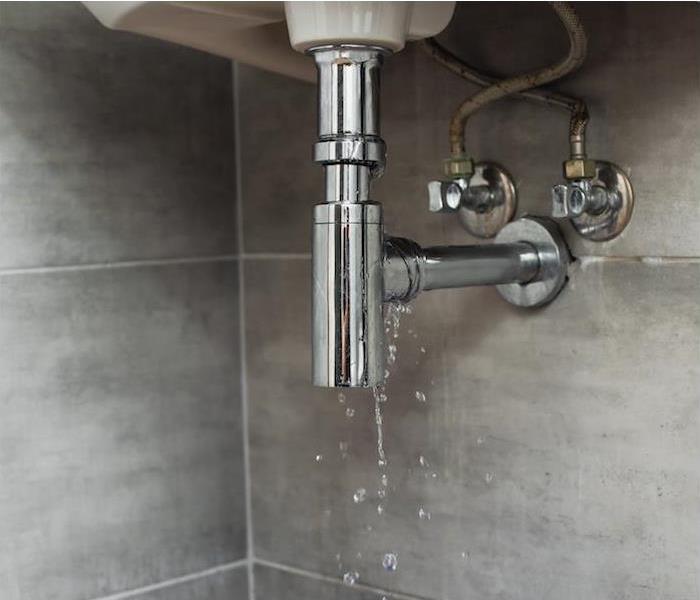 SERVPRO of Conway & Faulkner Counties is your 24/7 water restoration expert. Call us right away if you need immediate service.
SERVPRO of Conway & Faulkner Counties is your 24/7 water restoration expert. Call us right away if you need immediate service.
Have you ever put off fixing a leaky faucet or delayed drying out a small water spot in your home? If you have, chances are that the lingering effects caused more damage than if you had taken care of it as soon as the issue presented itself.
An average household leak can waste up to 10,000 gallons of water in a year.
Water damage can progress rapidly if left untreated. The damage can seep into floorboards, walls or drywall, and can ruin fragile items in your home. It’s crucial to address the issue right away to give your home the best chance of a full restoration.
Here’s what you need to know about how quickly water damage can move through your home:
In the First 24 HoursIf you live in a house, there is a one in four chance of a flood damaging your home within a 30-year period in a high-risk area. Living in the South, we are susceptible to flash flooding from storms, so it is crucial to know what to do early on after the weather event has passed.
Make sure to be proactive in the first 24 to 48 hours following the damage to ensure the least amount of your belongings and possessions become casualties of the water. Certain items will immediately become waterlogged and ruined if not cared for right away.
Items like cozy chairs, scrapbooks or that family quilt that has been passed down for generations can be compromised beyond repair if quick action is not taken. Items like these can take a long time to dry out and sometimes are not salvageable. Additionally, mold grows quickly and efficiently on these things and can make matters worse.
Here at SERVPRO of Conway & Faulkner Counties, we have the “restore vs. replace” mentality. Your possessions matter to us, and we do our best to save the precious things that cannot be replaced.
However, if something cannot be restored, this will be communicated to you. These things are typically removed as soon as possible to expedite the drying of all restorable materials.
Within the First WeekMold can spread like wildfire if it is not cleaned up and removed properly in this timeframe. If it sets in, it can be incredibly hard on your home’s internal structure and can even compromise its integrity.
After One WeekAfter a week, the costs and efforts to restore your home will continue to increase and cause you more money and expertise to reverse. The very structure of your home can become damaged beyond repair as well.
How SERVPRO of Conway & Faulkner Counties Will HelpSERVPRO’s restoration process begins with the first call, preferably within the first 24 hours. We begin by thoroughly extracting the water to prevent further spread and to speed up drying time. Most likely, your floors, furniture and other possessions will also need to be cleaned, sanitized and deodorized as well. We finish by using our powerful drying equipment to remove the rest of the moisture and hidden water.
After these initial steps, your home may need construction work to get your property back to its preloss condition. Whether it be a small repair or a massive rebuild, we will be able to help with the restoration and the repairs. We will take you along with us at every step and have you back in your home or business as soon as we can.
Regardless of the type of water damage sustained, SERVPRO has the tools and teams to help your home or business recover. Contact us 24⁄7 when you need a dependable team to help you recover.
3 Types of Natural Flooding & Their 4 Main Causes | SERVPRO® of Conway & Faulkner Counties
4/6/2022 (Permalink)
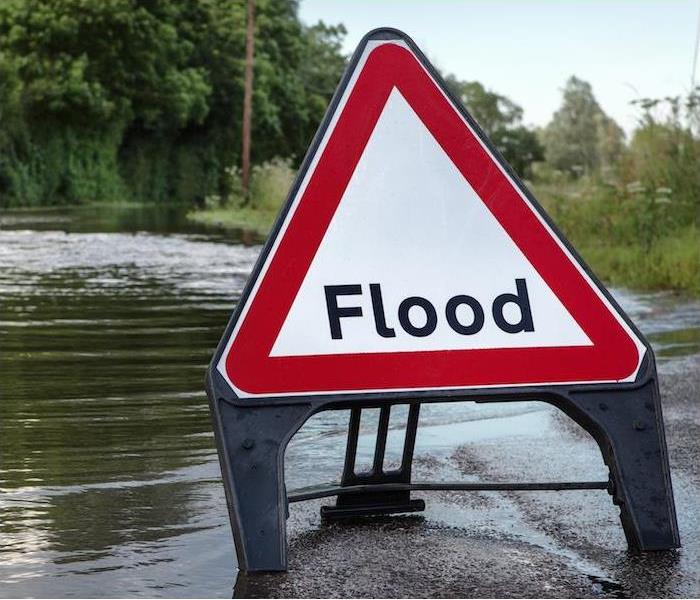 Regardless of the cause of the flooding, SERVPRO of Conway & Faulkner Counties has the team to help you recover from any disastrous event.
Regardless of the cause of the flooding, SERVPRO of Conway & Faulkner Counties has the team to help you recover from any disastrous event.
As the most common type of natural disaster, flooding is also the most fatal, claiming more lives in the United States annually than hurricanes, tornadoes or lightning. The damage that flooding causes can be localized to one home or impact an entire community depending on its severity.
Flooding can truly happen anywhere in the United States and cause a variety of damages, but there are some key similarities in the type of flooding and what causes it. Today, we will look at the three typical types of flooding and the four reasons they often occur.
The 3 Types of FloodingFlash floods are the most common type of flood, happening when a storm cell is very wide or parks itself over an area, producing heavy, localized rainfall. Flash flooding happens fast and produces strong currents, often carrying away people and cars caught in its path.
River floods occur when there is too much water for a riverbank to reasonably hold. The water will rise over the sides of the bank, producing flooding in the surrounding area.
Coastal floods happen in areas next to large bodies of water, when storm surges or cyclonic activity causes ocean or gulf levels to rise to flood levels.
The 4 Reasons Natural Flooding Often OccursHeavy rainfall. When storms bring about a large amount of rainfall, flooding becomes rather likely. Typically this will manifest as flash floods or river flooding, with urban areas being more at risk. Any area that has a large amount of concrete is more susceptible to flooding, as that inhibits the ground’s ability to absorb excessive amounts of water.
Oceanic activity. A storm surge or hurricane can lead to the rising of an ocean tide, which can then cause coastal flooding. The areas right along the coast are the most endangered, but the water can spread rapidly inland as well.
Dams and levees failing. Many people remember the devastation caused by 2005’s Hurricane Katrina, which was due in part to the levees breaking. This can be extremely devastating, as it releases a large volume of water rapidly.
Snowmelts and ice dams. When in an area that experiences heavy snowfall, spring brings about a lot of melting in a short amount of time, which can lead to flooding. This can be exacerbated by river floods caused by ice dams or ice jams that block the water’s flow downstream.
Regardless of the cause of the flooding, SERVPRO has the tools and teams to help your home or business recover from its disastrous effects. Contact us anytime when flooding or water damage makes a mess in your life.
The High Costs of Water Damage | SERVPRO® of Conway & Faulkner Counties
2/6/2022 (Permalink)
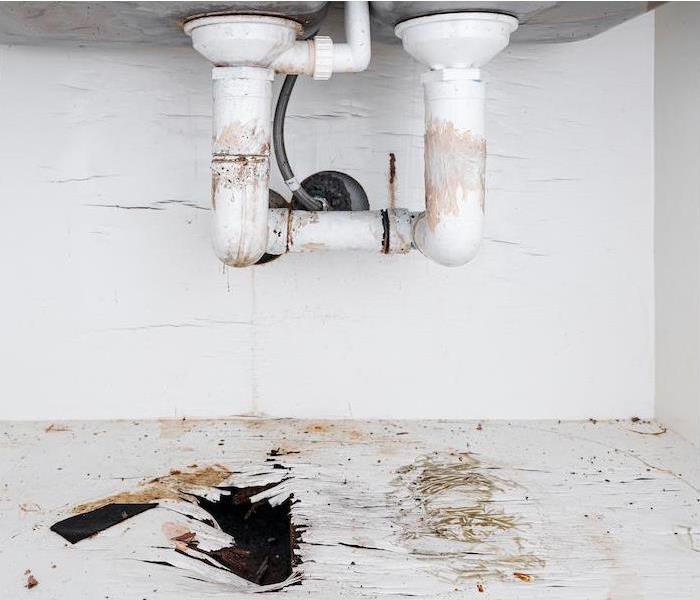 If water damage catches you off-guard and leaves you all wet, you’ve got help on your side. Contact SERVPRO of Conway & Faulkner Counties.
If water damage catches you off-guard and leaves you all wet, you’ve got help on your side. Contact SERVPRO of Conway & Faulkner Counties.
As a homeowner, water can become a big threat to your home and your possessions. While water helps our world grow and function, it can also cause big problems if you don’t stay aware.
A home has plumbing and appliances that use water every single day. And no matter how prepared or maintained you think your home is, the truth is sometimes things happen that are beyond our control.
But with that said, you can help put your mind at ease by ensuring that your pipes and appliances are well-equipped and maintained. Doing so can lower your risk of becoming a water damage statistic.
24. This is the percentage of all home insurance claims that have something to do with water damage. Almost one in every four insurance claims has to do with water damaging a home or business.
48. This number represents how long you have before your water damage can become a bigger issue, like mold. You typically have only 48 hours before water damage stimulates mold growth in your home—and sometimes it doesn’t even take that long.
98. This is the percentage of homes with a basement that will have water damage at some point. Keep an eye on your basement, looking for signs of a leak, like discoloration or a musty odor.
10,234. Water damage can not only ruin your possessions or equipment—it can also cause major structural damage to a home. That’s why $10,234 is the average amount paid out for water damages.
14,000. If you had to guess how many water damage emergencies happen each day, would you guess 14,000? It’s accurate. That means that every six seconds someone is having to deal with a busted pipe or some other water emergency.
13,000,000,000. In this case, 13 billion is referring to the annual cost of water damage only in the United States. Eye-opening, right?
Some of these numbers can be quite scary, but you can rest easier knowing that most water damage can be prevented. Keep up with the maintenance of your home, regularly checking your appliances and plumbing. Do what you can to help reduce the risk of having to deal with water damage.
If water damage catches you off-guard and leaves you all wet, you’ve got help on your side. Contact SERVPRO to see how we can quickly and fully restore water damage to your home or business.
What to Expect When You Call Us for Water Damage | SERVPRO® of Conway & Faulkner Counties
2/6/2022 (Permalink)
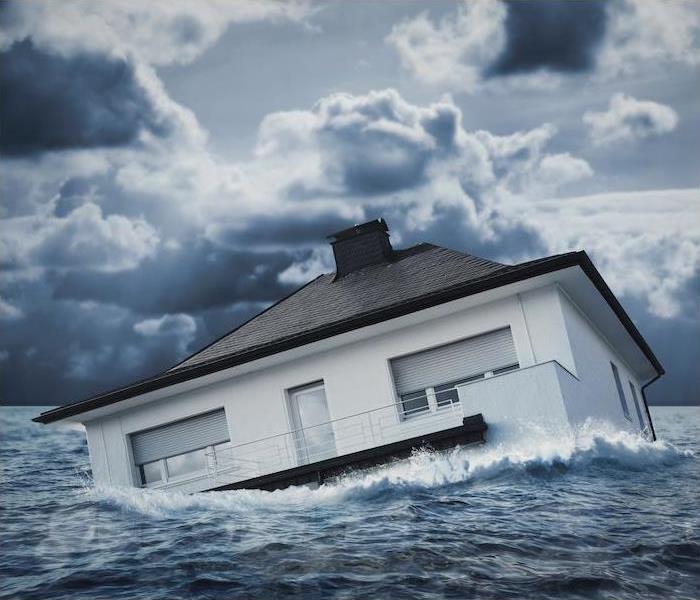 When water damage strikes, make the call to SERVPRO of Conway & Faulkner Counties for A-to-Z cleanup and restoration.
When water damage strikes, make the call to SERVPRO of Conway & Faulkner Counties for A-to-Z cleanup and restoration.
What would you say if we told you that on a daily basis there are 14,000 Americans who experience water damage issues in their homes? If you happen to be one of these people, don’t panic, at SERVPRO, we are here for you.
Once you contact SERVPRO, we will work quickly and efficiently to get your home back to normal. Here’s what you can expect from us:
Emergency Contact. Our specialists are on hand 24 hours a day, seven days a week, and we are ready to help at any moment’s notice. During your initial call, we will get information about the damage, set up an appointment to come and assess it for ourselves and then determine next steps. Because quick action is crucial, we will be there to help in no time.
Inspection and Water Damage Assessment. When our technicians arrive, we will immediately go to the source of the problem to address it. If the water damage was caused by a leak, we’ll plug it. We will then evaluate the damage, marking hazards along the way. We will then determine what can be saved, restored or replaced.
Water Removal. Because we use powerful pumps and extraction units, we can remove hundreds (or thousands) of gallons of water damage from your home. By removing all the standing water, we can help reduce the risk of mold and speed up the drying time.
Damaged Material Removal. While we try to preserve and restore as much as possible, water damage can render some items irretrievably damaged. We’ll identify those items and remove them from the home.
Cleaning, Sanitizing and Deodorization. With water in the home, soaking into things, there’s no doubt that you are going to want to sanitize and deodorize your home. We can do this by using our industry-leading equipment along with time-tested techniques.
Drying. Once the bulk of the water has been removed, there’s probably water that can’t be seen by the naked eye. We will use cutting-edge equipment to help remove that excess water and moisture so that we can reduce the risk of mold.
Monitoring. As your home is going through the drying process, we will reach out to you by phone and through site visits daily. Our job is to ensure that the drying process is working, and we can adjust equipment as needed to help speed up the process.
Repairs and Construction. Once the water extraction is complete, the real work begins! We can do it all, large or small. We will handle any reconstruction or repair that you need—and we work to help keep the cost down by being your one-stop shop.
When water damage strikes, make the call to SERVPRO for A-to-Z cleanup and restoration. We’ll make your damaged property look “Like it never even happened.”
Water Leaks Don't Consider Your Schedule...That Is Why We Are Here
9/21/2021 (Permalink)
Have you ever thought that you do not have time for the things that happen in your life that are not expected?
SERVPRO of Conway & Faulkner Counties knows that water leaks don’t always occur during regular business hours and that is why we provide emergency mitigation services 24 hours a day, 7 days a week, 365 days, including holidays.
While you are waiting for help to arrive here are a few things that you can do to help minimize damage to your property. If the water loss is from a clean water source, such as a water supply line, sink or tub overflow, hot water heater leak, appliance malfunction, or a burst pipe you can do the following tips to help minimize damage. If the water loss is not from a clean water source then wait for help to arrive as the water could be contaminated.
- Shut water off
- Remove excess water by mopping or with towels. Do NOT try and extract water with your vacuum cleaner
- Move valuable furniture or sensitive items to a dry area of the home. If you can not move the furniture try to place reynolds wrap or bowls under the feet of wooden furniture and use clothespins to pin material from furniture off damp floors.
- Remove rugs from wet carpeting.
- Remove loose items from the floors
Our trained restoration team will get your residential or commercial emergency taken care of in a timely manner. We can be reached at 501-328-3301.
Summer Months and Water Damage
6/25/2021 (Permalink)
Hot summer season has reached us and we love to turn on the air conditioning and head to the pool.
However, just because the risk for frozen pipes has passed, the risk of water damage still poses a threat even during the summer months.
The extended use of air conditioning units in the summer months means, if not properly maintained, can cause drainage issues. To try and avoid this make sure to change your air filter regularly. Also having regular inspections and cleanings are also important to try and prevent any issues in your unit from worsening. One thing that is always good to keep an eye on is the drain pan. Check to make sure water isn’t accumulating in the pan.
Another thing to keep in mind is the potential for pipes to burst. Although burst pipes are more common during the colder months, hot summer weather can still cause this for a home or property owner. If there is any change in your water pressure than this should be inspected and you should ask why this could be happening. While it could be simply be nothing, it could also be a sign that their is a problem that could lead to a broken pipe. It could be a result of corrosion build-up which leads to leaks and eventually a broken pipe that has affected your home or business.
Another thing to keep an eye out for is cracks appearing in the walls, especially around the corners. This could mean there are changes to your foundation, which could lead to a slab leak.
These are a few things to watch out for in the summer months so that the summer can be enjoyed. If you have a need for an inspection or have water damage give us a call at 501-328-3301.
Fozen Pipe Prevention and Tips
2/12/2021 (Permalink)
Freezing weather is moving into Conway and Faulkner Counties in Arkansas within the next several days and the best thing you can do is know how to keep your pipes from freezing before those below freezing temperatures hit. Frozen pipes can be preventable. SERVPRO of Conway & Faulkner Counties wants to offer some tips on how to keep this from happening in your home or business.
How to prevent frozen pipes
Here are some recommend ways to keep your pipes from freezing.
- Open kitchen and bathroom cabinet doors to allow warmer air to circulate around the plumbing, especially if your sinks are on an exterior wall. (If you have small children, be sure to remove any harmful cleaners and household chemicals.)
- Keep garage doors closed, especially if there are water supply lines in the garage.
- Let the cold-water drip from a faucet served by exposed pipes. Running water through the pipe—even at a trickle—helps prevent pipes from freezing.
- Keep the thermostat set to the same temperature during day and night. During a cold snap it is not the time to set back the thermostat at night.
- Seal cracks and openings around windows, doors, and at sill plates, where the house rests on its foundation.
- If you plan to be away during cold weather, leave the heat on in your home, set to a temperature no lower than 55° F.
What to do if frozen pipes occur
If you turn on a faucet and only a trickle comes out, you may well have a frozen pipe. If a pipe has broken than turn off the water at the main shutoff valve, which is usually at the water meter or where the mainline enters the house. If the water is still running and no pipes have burst, you can take the following steps. (Of course, if you suspect a more serious problem, call a plumber.)
- Turn on the faucet. As you heat the frozen pipe and the ice plug begins to melt, you want the water to be able to flow through. Running water through the pipe, as cold as it is, will help melt ice in the pipe.
- Apply heat to the section of pipe using an electric heating pad wrapped around the pipe, an electric hair dryer, or by wrapping pipes with towels soaked in hot water. As tempting as it may be, do not use a blowtorch, kerosene or propane heater, a charcoal stove, or any device with an open flame; the high heat can damage the pipes or even start a fire.
- Apply heat until full water pressure is restored. Check all other faucets in your home to see whether you have additional frozen pipes. If one pipe freezes, others may freeze, too.
If you have had damage from frozen pipes or have questions call SERVPRO of Conway & Faulkner Counties anytime at 501-328-3301 and we can answer your questions or inspect your damage for free.
What About My Pool in Freezing Weather
2/12/2021 (Permalink)
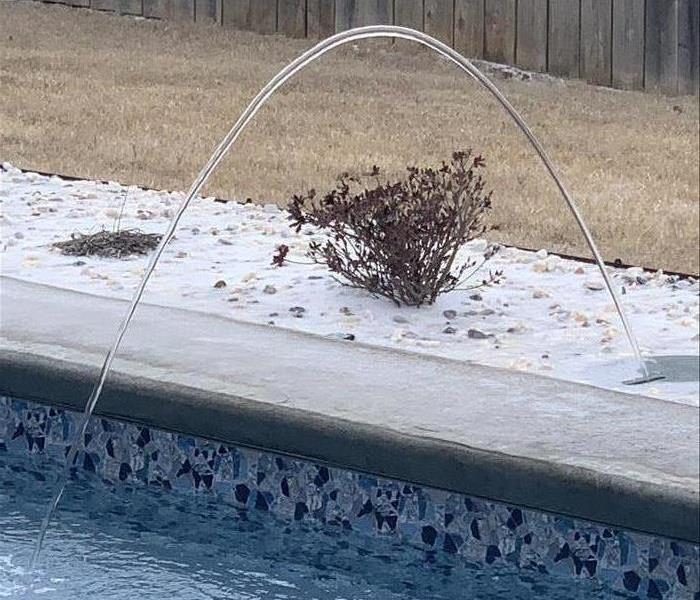 Keeping your jets flowing in your swimming pool during freezing temperatures
Keeping your jets flowing in your swimming pool during freezing temperatures
With the freezing temperatures that are moving into Arkansas in the next several days frozen pipes are a real concern, but some people might not think about the damage that can occur to their swimming pools if they have a pool that has not winterized. This can be a costly repair if these pipes crack or freeze, so the best way to keep this from happening is by prevention.
If your pool has not been winterized there is still a way to keep damage from happening to your pipes. The water needs to stay circulated. This means keeping your pump running 24 hrs a day. Also, if you have any Lumineers or jets keep those running as well. This helps maintain a constant water temperature and keeps the water moving. SERVPRO of Conway & Faulkner Counties is here to help if you have any questions or find you are in need of services please give us a call at 501-328-3301.
Appliance Leaks and Water Damage
2/12/2021 (Permalink)
When was the last time you inspected your appliances? Many of us don’t give a second thought about our household appliances that we use every day and the amount of wear and tear they receive. Most appliances that we use utilize water. This means they are prone to leaks if not maintained. Water damage can sit for a long time before damage is realized. Therefore, regular inspections are important for prevention.
Inspect These Appliances Often:
A hot water heater will typically have a lifetime of 10 to 15 years, but leaks can start much earlier than this. The seals and pipes connected to the hot water heater can often break. Keeping an eye out for any accumulation both during and after use is a smart move.
Refrigerators are not moved very often, which can lead to water damage that has happened that you don’t know about. A refrigerator’s water lines are typically made from a soft plastic that can easily fail, so checking for leaks behind and under the fridge as part of your annual home maintenance is wise.
A dishwasher is just as problematic as a refrigerator but is even more isolated and utilizes far more water. Additionally, homeowner’s insurance often does not cover water damage caused by older models of dishwashers, so knowing what models are not covered by your insurance company is a good idea.
Washing machine hoses are some of the most common sources of leaks. It is recommended that they are inspected at least once a month by homeowners. In addition to these regular checks, they should be fully replaced every five years to prevent hidden deterioration.
The drain in your HVAC unit is designed to keep condensation from pooling in and around the unit, but if this drain malfunctions water damage can quickly be caused. Having a professional technician evaluate your machine is the best defense against HVAC created water damage.
Some Do's and Don'ts When Water Damage Happens
2/12/2021 (Permalink)
Do you know what to do when water damage happens in your home? Do you know what to do and not to do?
Water damage can happen to anyone’s home resulting in property damage. Here are some things to do and don’ts if you have a water loss. With the right tools and pieces of equipment, our professionals at SERVPRO of Conway & Faulkner Counties can safely dry out your home or business. Here are some things to always keep in mind.
- Do shut off the source of water and turn off the electricity.
- Do try and move furniture if it is safe to do so, to ensure that more damage does not happen to the furniture. If it is not safe to move the furniture than place Reynolds wrap or plastic bowls under the feet of the furniture until help arrives.
- Do not enter a room with standing water, there could be a potential for electrical shock.
- Do not lay wet rugs on furniture upholstery because the fabrics have the potential to bleed between each other.
- Do not use your household vacuum to try and suck up any water.
These tips can help to minimize damage, and you will be better prepared for help to arrive. Remember to stay safe and get the water damage cleaned up professionally to minimize the chance of mold growth. Our Team at SERVPRO of Conway & Faulkner Counties is ready to assist at a with any of your water mitigation emergencies. Give our team a call at 501-328-3301.
Shower or Bathtub Leaks
5/20/2020 (Permalink)
We have been receiving quite a few calls concerning shower leaks, so we thought that sharing some information about how to identify a water leak around your shower or tub would be helpful.
- Water Stains: Water stains can show up around the walls of your tub and shower, but they may also make their appearance below your bathroom. If the bathroom is on the second floor, you can check for signs of a shower pan leak by looking at the ceiling under the bathroom. If it is on the first floor, you may need to go into the crawlspace or basement to look for signs of water stains.
- Grout Cracks: Tiled showers can show signs of a leak too. When the moisture gets trapped behind the tiles, it tries to come out wherever it can. This leads to cracked grout lines. Sometimes you may even notice cracks in your tiles.
- Loose Flooring: A bathtub leak can cause damage with the flooring in your bathroom. Whether you have tile or vinyl floors, you may notice the building materials have become loose. If tiles wiggle when you step on them, it could be a sign there is a leak. Laminate flooring, on the other hand, may start to curl up when introduced to too much moisture. When water gets underneath laminate flooring there is not a way to dry the water and the flooring will need to be removed.
- Peeling Paint: Look at the walls around the tub and shower. Do you notice peeling paint or falling down wallpaper? This could be a sign that there's moisture being released into the walls.
You may be able to notice signs of a bathtub leak before the damage becomes detrimental to your home. Working with a residential water cleanup team can help you find water issues quickly. A shower or bathtub leak is something you want to catch as soon as possible or it can cause major damage to your walls, insulation and flooring. For more information please call us at SERVPRO of Conway & Faulkner Counties at 501-328-3301.
Has Water Damage Affected Your Carpet?
5/20/2020 (Permalink)
How do you decide if your carpet can be dried out and re-stretched after having water damage in your home? Whether or not your carpet can be saved depends on the type of water that affected the carpet and how long the carpet was wet.
Here are the 3 main categories of water:
Clean Water
If the water comes from a pipe break or leaking water supply line, this is considered a clean water source. The carpet could be dried out and saved for re-use, but If the carpet is heavily soiled or left wet for an extended period, it can deteriorate further. If found early than the carpet can usually be saved.
Gray Water
Gray water comes from an overflowing toilet, or from a malfunctioning dishwasher or washing machine. The decision to keep carpet exposed to gray water is a tricky one and may depend on the speed of removal and whether an effective disinfection process can be done.
Black Water
Black water is the worst of the 3 categories of water. This type of water loss can come as a result of a sewer back up or other situation where feces, microbes or harsh chemicals may be present. It involves careful handling to extract, and careful attention to subsequent disinfection and disposal of contaminated items. Carpet removal needs to be done for black water losses.
Give SERVPRO of Conway & Faulkner Counties a call if you have any questions or need help with water damage to your home or business. You can reach us 24/7 at 501-328-3301. We can help you make the hard decisions about whether replacing your carpet is necessary and help restore a safe and comfortable home for your family.
Frozen Pipes? Now What?
2/4/2020 (Permalink)
Do you know how to prevent frozen pipes?
The weather has been mild in central Arkansas this year, but winter is not over yet, and it might be a good idea to know how to keep your pipes from freezing. SERVPRO of Conway & Faulkner Counties would like to offer you a few tips on how to keep this from happening in your home or business.
Open cabinet doors in your kitchen and bathroom to allow warmer air to circulate around the plumbing, especially if your sinks are on the outside wall.
Let the cold water drip from the faucet. Running water through the pipe helps prevent pipes from freezing.
What to do if frozen pipes occur - If you turn on a faucet and only a trickle comes out, you may well have a frozen pipe. If a pipe has broken, turn off the water at the main shutoff valve, which is usually at the water meter or where the mainline enters the house. If the water is still running and no pipes have burst, you can take the following steps. (Of course, if you suspect a more serious problem, call a plumber.)
Turn on the faucet. As you heat the frozen pipe and the ice plug begins to melt, you want the water to be able to flow through. Running water through the pipe, as cold as it is, will help melt ice in the pipe.
Apply heat to the section of pipe using an electric heating pad wrapped around the pipe, an electric hair dryer, or a portable space heater (kept away from flammable materials), or by wrapping pipes with towels soaked in hot water. As tempting as it may be, do not use a blowtorch, kerosene or propane heater, a charcoal stove, or any device with an open flame; the high heat can damage the pipes or even start a fire.
Apply heat until full water pressure is restored. Check all other faucets in your home to see whether you have additional frozen pipes. If one pipe freezes, others may freeze, too.
Drying Equipment
2/4/2020 (Permalink)
SERVPRO of Conway & Faulkner Counties has the equipment, training, and experience to find and dry unseen water before secondary damages occur. The proper equipment makes a measurable difference in reducing the damage expense during a water loss. If is important to handle every water problem as a real threat to your property. Technology and equipment must be counted on to perform these services properly. Here are a few tools used by our technicians.
- Moisture Sensors-Used to detect moisture in carpets, baseboards, and walls.
- Moisture Meters-Used to determine the actual moisture content of various materials. The moisture meter provides accurate readings, allowing the SERVPRO of Conway & Faulkner Counties technicians to monitor the drying process.
- Thermohygrometers-This is used to measure the temperature and relative humidity. Having this information, allows our technicians the ability to calculate and create an environment most conducive to drying.
- Ultra-Low-Volume (ULV) Foggers-Used to atomize liquid deodorizing agents, producing a fine mist that can easily penetrate the site where odor-causing residues may accumulate. This device can also be used to inject fungicides and disinfectants into wall cavities and other hard to reach areas.
- Thermal Foggers-Used to dispense solvent-based products by creating a dense fog. The fog consists of tiny particles of deodorant solution that attach to and neutralize odor-causing particles to deodorize structures, garments, automobiles and other places where cleaning cannot reach.
Call SERVPRO of Conway & Faulkner Counties, we have the training and equipment to make it "Like it never even happened." Call us today at 501-328-3301
Preventative Tips For Water Damage
2/4/2020 (Permalink)
Water damage to homes after a flood or a heavy rain can be disastrous. Oftentimes, these events are unexpected, and if we are not prepared for what may happen, we can suffer more water damage than we need to.
- Inspect Your Home. Take a good look around your home, are you prepared for wet weather? Do exterior doors fit as tightly as they should, and are the doors and windows weather stripped? Have you looked at your roof to see if it needs any maintenance? Are there low lying areas in your yard, and does it drain well?
- Maintenance. Regularly check your rain gutters and spouts, if they get clogged with debris such as dead leaves or small branches, they are not going to be able to drain away rainwater. If water were to back up it can leak back to walls of your home, without you knowing it, and you could have water damage you didn't know about, and even mold. Regular maintenance will help alleviate these problems.
- City Communication. Power lines and telephone poles near your home can be an issue when storm season comes if they are not in good condition. Contact your utilities companies and have them come take a look prior to wet weather to make sure you and your loved ones will be safe. Be aware of the condition of any large trees on your property. If the grounds become saturated, a tree with an unstable root base can fall and create problems. Make sure you know who to call should you need help.
SERVPRO of Conway & Faulkner Counties is ready to help in any way we can. If you have sustained water damage to your property, give us a call today at 501-328-3301.
Laundry and Water Damage
2/4/2020 (Permalink)
Did you ever think your house could be flooded by doing laundry?
In our office at SERVPRO of Conway & Faulkner Counties we receive calls from homeowners who have had water damage from their washing machines. Appliances can cause significant water damage to your home. If you leave the house with your washing machine running, you could return home to a flooded house and if you start laundry on your way to bed, you may wake up step in a pool of water.
Here are a few reasons why washing machines malfunction.
- They can malfunction and not cycle themselves off and continue to run
- The drain hose can become disconnected and your machine will not fill up with water, but the water will continue to run.
It is a good idea to have your appliances checked regularly, and don’t leave the house or go to bed and start your laundry. These two tips will help cause less damage to your home if you have a washing machine that malfunctions and causes water damage in your home.
If you find yourself in this situation, give us a call at 501-328-3301 and our team at SERVPRO of Conway & Faulkner Counties will be there to help!
Water Damage Emergency Tips
5/29/2018 (Permalink)
What you can do until help arrives
After any water damage situation, your primary focus should be safety first:
- Is it safe to stay in the house?
- Electrical and "slip and fall" hazards are some of the most prevalent concerns.
- Only do activities that are safe for you to perform.
- Wet materials can be VERY heavy. Be careful!
Have A Water Damage Emergency? Call (501) 328-3301
What To Do After Flooding
- Remove excess water by mopping and blotting.
- Wipe excess water from wood furniture after removal of lamps and tabletop items.
- Remove and prop wet upholstery and cushions.
- Place aluminum foil or wood blocks between furniture legs and wet carpeting.
- Turn air conditioning on for maximum drying in summer.
- Remove colored rugs from wet carpeting.
- Remove art objects to a safe, dry place.
- Gather loose items from floors.
What NOT To Do After Flooding
- Don't leave wet fabrics in place. Hang furs and leather goods.
- Don't leave books, magazines or other colored items on wet carpet or floors.
- Don't use your household vacuum to remove water.
- Don't use television or other household appliances.
- Don't turn on ceiling fixtures if ceiling is wet, and keep out of rooms where ceilings are sagging.
Faster to your Conway and Faulkner Counties Water Damage Event
5/24/2018 (Permalink)
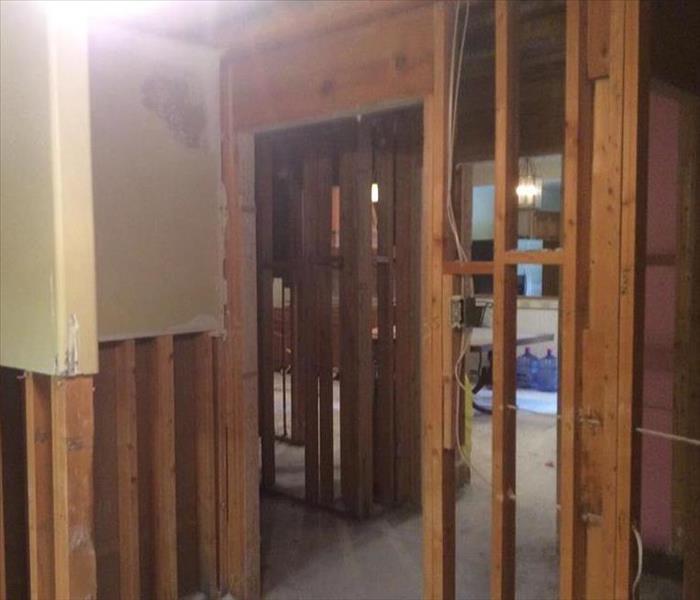 SERVPRO of Conway and Faulkner Counties reacted to water damage in a home in Little Rock, Ark.
SERVPRO of Conway and Faulkner Counties reacted to water damage in a home in Little Rock, Ark.
Flooding and water emergencies don’t wait for regular business hours and neither do we. SERVPRO of Conway and Faulkner Counties provides emergency cleaning and restoration services 24 hours a day, 7 days a week- including all holidays.
Faster To Any Size Disaster
Flooding and water damage is very invasive. Water quickly spreads throughout your home and gets absorbed into floors, walls, furniture, and more. SERVPRO of Conway and Faulkner counties arrives quickly and starts the water extraction process almost immediately. This immediate response helps to minimize the damage and the cleaning and restoration costs.
Need Emergency Service? Call Us 24/7- 501-328-3301
Water Damage Timeline
Within Minutes
- Water quickly spreads throughout your property, saturating everything in its path.
- Water is absorbed into walls, floors, upholstery, and belongings.
- Furniture finishes may bleed, causing permanent staining on carpets.
- Photographs, books, and other paper goods start to swell and warp.
Hours 1-24
- Drywall begins to swell and break down.
- Metal surfaces begin to tarnish.
- Furniture begins to swell and crack.
- Dyes and inks from cloth and paper goods spread and stain.
- A musty odor appears.
48 Hours to 1 Week:
- Mold and mildew may grow and spread.
- Doors, windows, and studs swell and warp.
- Metal beings to rust and corrode.
- Furniture warps and shows signs of mold.
- Paint beings to blister.
- Wood flooring swells and warps.
- Serious biohazard contamination is possible.
More than 1 Week:
- Restoration time and cost increase dramatically; replacing contaminated materials and structural rebuilding may be extensive.
- Structural safety, mold growth, and biohazard contaminants pose serious risks to occupants.
About SERVPRO of Conway and Faulkner Counties
SERVPRO of Conway and Faulkner counties specializes in the cleanup and restoration of residential and commercial property after a fire, smoke or water damage event. Our staff is highly trained in property damage restoration. From initial and ongoing training at SERVPRO’s corporate training facility to regular IICRC-industry certification, rest assured our staff is equipped with the knowledge to restore your property.
Winter isn't quite over yet...
3/8/2018 (Permalink)
Here is some great information on freezing pipes that the American Red Cross have on their website! Check it out!
Why Pipe Freezing is a Problem
Water has a unique property in that it expands as it freezes. This expansion puts tremendous pressure on whatever is containing it, including metal or plastic pipes. No matter the strength of a container, expanding water can cause pipes to break.
Pipes that freeze most frequently are:
- Pipes that are exposed to severe cold, like outdoor hose bibs, swimming pool supply lines, and water sprinkler lines.
- Water supply pipes in unheated interior areas like basements and crawl spaces, attics, garages, or kitchen cabinets.
- Pipes that run against exterior walls that have little or no insulation.
How to Protect Pipes From Freezing
Before the onset of cold weather, protect your pipes from freezing by following these recommendations:
- Drain water from swimming pool and water sprinkler supply lines following manufacturer's or installer's directions. Do not put antifreeze in these lines unless directed. Antifreeze is environmentally harmful, and is dangerous to humans, pets, wildlife, and landscaping.
- Remove, drain, and store hoses used outdoors. Close inside valves supplying outdoor hose bibs. Open the outside hose bibs to allow water to drain. Keep the outside valve open so that any water remaining in the pipe can expand without causing the pipe to break.
- Add insulation to attics, basements and crawl spaces. Insulation will maintain higher temperatures in these areas.
- Check around the home for other areas where water supply lines are located in unheated areas. Look in the garage, and under kitchen and bathroom cabinets. Both hot and cold water pipes in these areas should be insulated.
- Consider installing specific products made to insulate water pipes like a "pipe sleeve" or installing UL-listed "heat tape," "heat cable," or similar materials on exposed water pipes. Newspaper can provide some degree of insulation and protection to exposed pipes – even ¼” of newspaper can provide significant protection in areas that usually do not have frequent or prolonged temperatures below freezing.
- Consider relocating exposed pipes to provide increased protection from freezing.
How to Prevent Frozen Pipes
- Keep garage doors closed if there are water supply lines in the garage.
- Open kitchen and bathroom cabinet doors to allow warmer air to circulate around the plumbing. Be sure to move any harmful cleaners and household chemicals up out of the reach of children.
- When the weather is very cold outside, let the cold water drip from the faucet served by exposed pipes. Running water through the pipe - even at a trickle - helps prevent pipes from freezing.
- Keep the thermostat set to the same temperature both during the day and at night. By temporarily suspending the use of lower nighttime temperatures, you may incur a higher heating bill, but you can prevent a much more costly repair job if pipes freeze and burst.
- If you will be going away during cold weather, leave the heat on in your home, set to a temperature no lower than 55° F.
How to Thaw Frozen Pipes
- If you turn on a faucet and only a trickle comes out, suspect a frozen pipe. Likely places for frozen pipes include against exterior walls or where your water service enters your home through the foundation.
- Keep the faucet open. As you treat the frozen pipe and the frozen area begins to melt, water will begin to flow through the frozen area. Running water through the pipe will help melt ice in the pipe.
- Apply heat to the section of pipe using an electric heating pad wrapped around the pipe, an electric hair dryer, a portable space heater (kept away from flammable materials), or by wrapping pipes with towels soaked in hot water. Do not use a blowtorch, kerosene or propane heater, charcoal stove, or other open flame device.
- Apply heat until full water pressure is restored. If you are unable to locate the frozen area, if the frozen area is not accessible, or if you can not thaw the pipe, call a licensed plumber.
- Check all other faucets in your home to find out if you have additional frozen pipes. If one pipe freezes, others may freeze, too.
http://www.redcross.org/get-help/how-to-prepare-for-emergencies/types-of-emergencies/winter-storm/frozen-pipes
We Specialize in Flooded Basement Cleanup and Restoration!
2/21/2018 (Permalink)
A basement can flood at any time, although flooding most often occurs during heavy rainfall. Basements are inherently prone to flooding because they are the lowest level of a building and are normally built partly or entirely below ground level. There are a number of reasons why your Conway & Faulkner basement could flood, including:
- A blocked or failed sewer lateral pipe
- Heavy rain causes surface water to pool around your home
- Storm sewer backup
- Sanitary sewer backup
- Foundation drainage failure
- Water supply-line break or hot-water tank failure
- And many more
Have Questions about Basement Flooding?
Call Today
If flood water is not handled quickly and properly, it can jeopardize your health and safety, and cause severe damage to your home’s structure. Remember, the longer you wait, the worse the problem will get.
The bottom line: a flooded basement can jeopardize your health, safety, and your home’s integrity. It’s worth making a call to SERVPRO of Conway & Faulkner Counties and let our trained, professional crews handle the situation safely and correctly. We have earned the trust of hundreds of homeowners, business owners, and property professionals.
We are Flooded Basement Specialists:
- We are Available 24 hours/7 days per week
- We’re a Preferred Vendor to many National Insurance Companies
- We Bill The Insurance Directly – One Less Thing For You To Worry About
- Our Technicians are Highly-Trained in Water Restoration Techniques
- We use s500 IICRC Restoration Standards
- Advanced Inspection and Extraction Equipment
Faster to your Cleburne County Water Damage Event
5/2/2016 (Permalink)
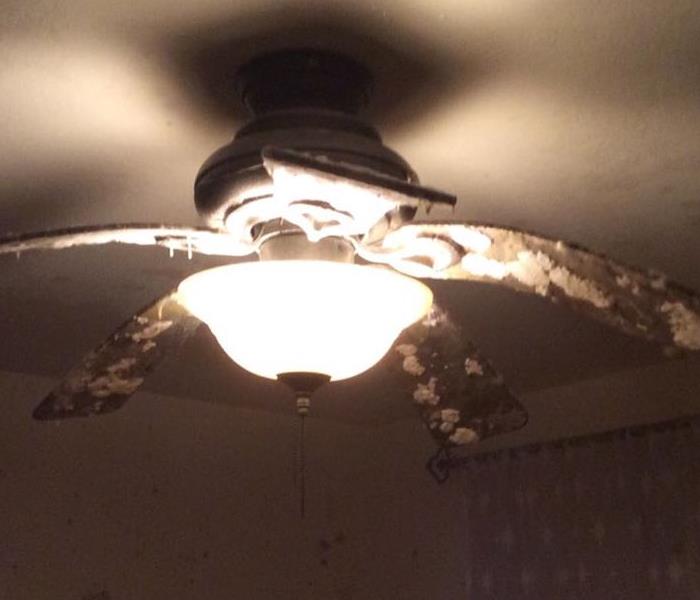 Water and Mold Damage cleanup in Cleburne County Arkansas.
The homeowner was notified by the water department about the amount of water on their bill
Water and Mold Damage cleanup in Cleburne County Arkansas.
The homeowner was notified by the water department about the amount of water on their bill
SERVPRO of Conway and Faulkner Counties provides 24 hour fire and water damage restoration service in Cleburne County
Flooding and water emergencies don’t wait for regular business hours and neither do we. SERVPRO of Conway and Faulkner Counties provides emergency cleaning and restoration services 24 hours a day, 7 days a week—including all holidays.
Faster To Any Size Disaster
Flooding and water damage is very invasive. Water quickly spreads throughout your home and gets absorbed into floors, walls, furniture, and more. SERVPRO of Conway and Faulkner Counties arrives quickly and starts the water extraction process almost immediately. This immediate response helps to minimize the damage and the cleaning and restoration costs.
Need Emergency Service? Call Us 24/7 – 501-328-3301
Water Damage Timeline
Within Minutes
- Water quickly spreads throughout your property, saturating everything in its path.
- Water is absorbed into walls, floors, upholstery, and belongings.
- Furniture finishes may bleed, causing permanent staining on carpets.
- Photographs, books, and other paper goods start to swell and warp.
Hours 1 - 24:
- Drywall begins to swell and break down.
- Metal surfaces begin to tarnish.
- Furniture begins to swell and crack.
- Dyes and inks from cloth and paper goods spread and stain.
- A musty odor appears.
48 Hours to 1 Week:
- Mold and mildew may grow and spread.
- Doors, windows, and studs swell and warp.
- Metal begins to rust and corrode.
- Furniture warps and shows signs of mold.
- Paint begins to blister.
- Wood flooring swells and warps.
- Serious biohazard contamination is possible.
More Than 1 Week:
- Restoration time and cost increase dramatically; replacing contaminated materials and structural rebuilding may be extensive.
- Structural safety, mold growth, and biohazard contaminants pose serious risks to occupants.
About SERVPRO of Conway and Faulkner Counties
SERVPRO of Conway and Faulkner Counties specializes in the cleanup and restoration of residential and commercial property after a fire, smoke or water damage event. Our staff is highly trained in property damage restoration. From initial and ongoing training at SERVPRO’s corporate training facility to regular IICRC-industry certification, rest assured our staff is equipped with the knowledge to restore your property.
Conway 24 Hour Emergency Water Damage Services
5/2/2016 (Permalink)
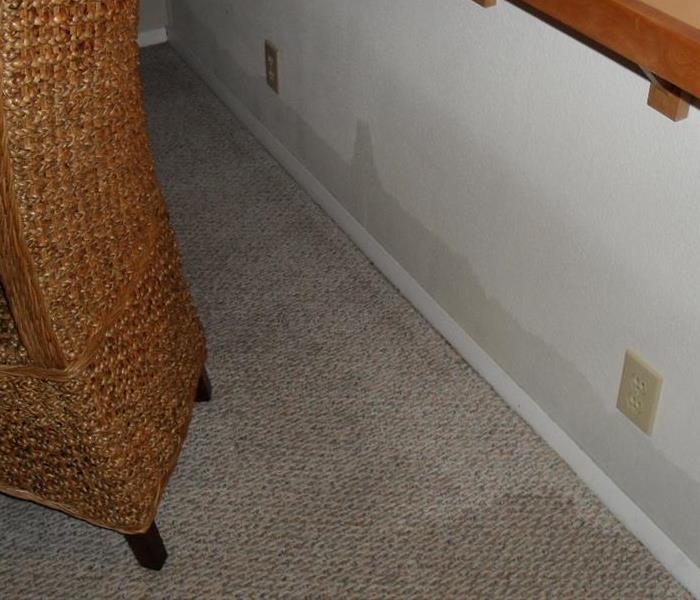 Water Clean-up in Conway AR
A water line broke under the Kitchen sink In Conway AR
This picture shows wet and damaged walls, and flooring.
Water Clean-up in Conway AR
A water line broke under the Kitchen sink In Conway AR
This picture shows wet and damaged walls, and flooring.
SERVPRO of Conway & Faulkner Counties is available 24 Hours a day for water emergencies, large or small. When you are dealing with water damage, immediate action is crucial. A delay of just a few hours can greatly increase the seveity of the water damage.
We Answer the Phone Ready to Help
Call Today- 501-328-3301
We understand that when you call us. you may be feeling confused, stressed, and vulnerable. You need an expert to guide you through this crisis. SERVPRO of Conway & Faulkner Counties has the specific water damage training and experience to help you through this tough time. We specialize in water damage restoration-in fact, it's the cornerstone of our business.
What to Expect
When you call, we will ask serveral questions regarding your water damage emergency. These questions will help us determine what equipment and resources to bring, including how many trained SERVPRO Professionals may be needed.
Our SERVPRO Repressentive will ask serveral questions:
* Your name and contact information
* Your insurance information (if applicable)
* The street address of the water-damage occur?
* What caused the water Damge (if known)?
*Is there electrcity available (on-site)?
* The areas that you know are affected
About SERVPRO of Conway & Faulkner Counties
SERVPRO of Conway & Faulkner Counties specializes in the cleanup and restoration of residential and commercial property after a fire, smoke or water damage event. Our Staff is highly trained in property damage restoration, From the initial and ongoing training at SERVPRO's corporate training facility to regular IICRC-industry certiication, reat assured our staff is equipped with the knowledge to restore your property.
 Safeguarding your home from water damage is easy this Fall with these insights from SERVPRO of Conway & Faulkner Counties!
Safeguarding your home from water damage is easy this Fall with these insights from SERVPRO of Conway & Faulkner Counties!




 24/7 Emergency Service
24/7 Emergency Service














